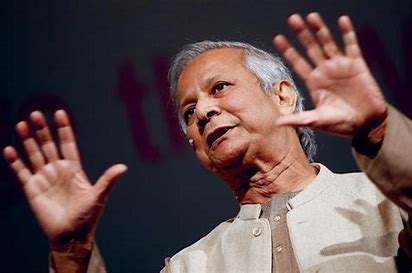
Tulip Siddiq thanks the people of her constituency of Hampstead and Highgate for electing her a Member of Parliament. Photo from Tulip’s official webpage.
The Pride and the Grief of British Bangladeshis
Tulip Siddiq has been a source of pride for the British Bangladeshi community since she entered the UK's political landscape. Her contributions have fostered a positive image of people of Bangladeshi origin living in the UK, who had long yearned for a figure like Tulip to be seen in the broader British perspective.
Tulip is known for her work in advocating for the rights and representation of British Bangladeshis, highlighting both the pride and the challenges faced by both the British people and her community.
"Not long ago, we British Bangladeshi people expected no more than a councillor position in the UK's mainstream politics. But Tulip broke the glass ceiling, taking our confidence sky-high and making us proud by becoming the first British Bangladeshi to be elected as a minister in the UK cabinet," said a senior community member who has been in the UK for over five decades.
Tulip was appointed as the Economic Secretary to the Treasury and City Minister in July 2024. This was a significant milestone, not only for her but also for the British Bangladeshi community, as it highlighted the increasing representation and influence of British Bangladeshis in UK politics.
Tulip's journey to becoming the first British Bangladeshi elected as a minister is truly inspiring. She has been a Member of Parliament for Hampstead and Kilburn since 2015 and has consistently worked on various social justice, education, and human rights issues. Her appointment as the Economic Secretary to the Treasury and City Minister marked a significant milestone in her career and for the British Bangladeshi community.
Before her ministerial role, Tulip was known for her advocacy for maternity rights, being the first MP to take maternity leave via the proxy voting system. She has also been an active voice in international human rights discussions and has received several awards and recognitions for her contributions.
Human Rights Campaigns: Beyond domestic issues, Tulip has been an active voice in international human rights discussions. She has used her platform to advocate for justice and democracy and raise awareness about global issues, including the plight of Rohingya refugees.
Advocacy for the Rohingya: Her vocal advocacy for the Rohingya refugees has been significant. She has spoken passionately about the systematic oppression and ethnic cleansing faced by the Rohingya community in Myanmar. During a debate in the House of Commons, she expressed her pride in Bangladesh for taking in more than half a million Rohingya refugees despite the country's own economic challenges. She has called on the British government to support Bangladesh in managing the sheer number of refugees and to take a stand against the ethnic cleansing and genocide occurring in Myanmar. Her advocacy has been a significant part of her broader efforts in international human rights discussions.
Fight for Freedom of Speech and Press: Tulip played a significant role in the campaign for establishing press freedom by securing the release of Nazanin Zaghari-Ratcliffe, a British Iranian journalist who was detained in Iran from 2016 to 2022. As an MP, she was a prominent campaigner for Zaghari-Ratcliffe's release, using her platform to raise awareness and advocate for her freedom. Her efforts were part of a broader campaign that involved various stakeholders, including the UK government and international human rights organizations.
Advocacy for Maternity Rights: Tulip’s fight for maternity rights has been one of her most notable contributions. Her decision to challenge parliamentary norms by requesting proxy voting during her pregnancy highlighted the need for a more inclusive approach to working mothers in politics.
Awards and Recognition: Tulip’s work has garnered widespread acclaim. She has received several awards and recognitions for her contributions to social justice, education, and human rights. In January 2013, Tulip was named in the "British Bangladeshi Power & Inspiration 100". In December 2014, she was named by The Guardian as "one to watch" in British politics. In April 2015, The Sunday Times described her as one of the "rising stars" of the Labour Party.
Before entering Parliament, Tulip worked for organizations like Amnesty International, Save the Children, and the Greater London Authority. She also worked on political campaigns for notable figures like Ed Miliband and Barack Obama.
Born on September 16, 1982, in London, she has an impressive educational background. She attended Scholastica in Dhaka, Bangladesh, before moving to the UK. In London, she went to The Royal School, Hampstead, and Mill Hill School. She then pursued higher education at University College London, where she completed her undergraduate degree in English Literature. She furthered her studies at King's College London, earning a master’s degree in politics, Policy, and Government. As a child, she met notable figures such as Nelson Mandela, Bill Clinton, and Mother Teresa, and her family was invited to the White House.
The Grief: Resignation
On 14 January 2025, Tulip resigned from her position as a treasury minister due to ongoing questions about her financial connections to Sheikh Hasina’s government. Earlier, she referred herself to Laurie Magnus, the government’s adviser on ministerial standards.
Many British Bangladeshis expressed pain and anger about what happened to Tulip. One senior community member who has been deeply involved in his community in the UK for 45 years wrote:
"Despite not committing any crime, as the charges brought against her were unproven, a promising political career faced a major setback. Tulip is not just the granddaughter of Bangabandhu (Sheikh Mujibur Rahman, Bangladesh’s founding father), but also a proud achievement admired by the expatriate Bengali community. Our current generation of British-Bangalis looked up to personalities like Tulip and Rushanara (Rushanara Ali, MP, another British Bangladeshi) and dreamed of building their future. However, Tulip became a victim of a ruthless power struggle in Bangladesh. Having lived in this country for almost 45 years, like many others, I have witnessed the resignation of many ministers, including the UK prime minister, but I cannot recall seeing such violent and aggressive reporting in mainstream newspapers (both in the UK and Bangladesh) every day, continuously! We may never know the meticulous details or transactions of this cruel game, but we will remain witnesses to the shattered dreams of a generation.”
Some members of the British Bangladeshi community, however, hold differing opinions about Tulip’s resignation. Their views are not influenced by their status as members of the Bangladeshi diaspora, but rather by the political divide back in their home country, Bangladesh.
In her resignation letter to Prime Minister Keir Starmer, Tulip stated that an in-depth review by Sir Laurie Magnus, the Independent Adviser on Ministerial Standards, confirmed she had not breached the Ministerial Code. However, she decided to step down to avoid any potential distractions from the government's work.
She expressed her gratitude for the confidence shown in her and reaffirmed her loyalty to the Labour Government and its programme of national renewal and transformation. Siddiq also mentioned that her family connections, particularly her aunt, the former Prime Minister of Bangladesh, Sheikh Hasina, were a matter of public record and that she had provided full details of her relationships and private interests when she became a minister.
Keir Starmer accepted Tulip Siddiq's resignation with sadness. He thanked her for her commitment during her time as Economic Secretary to the Treasury, highlighting her role in spearheading the rollout of Banking Hubs and contributing to the success of the Chancellor's first Mansion House speech. Starmer also acknowledged that Sir Laurie Magnus, the Independent Adviser, found no breach of the Ministerial Code or evidence of financial improprieties on Siddiq's part. He appreciated her decision to step down to avoid distractions and made it clear that the door remains open for her to return to government in the future.
Keir Starmer’s response clearly shows that Tulip's political future is not at a standstill but rather has faced challenges amidst a climate of misinformation and disinformation. Commenting on Tulip's situation, BBC Political Editor Chris Mason noted on January 15 that “politics isn't a court of law, but a court of perceptions—where unanswered questions are dangerous because they lead to more headlines, regardless of their fairness.” Indeed, for Tulip, this situation reflects a "court of misperceptions."



